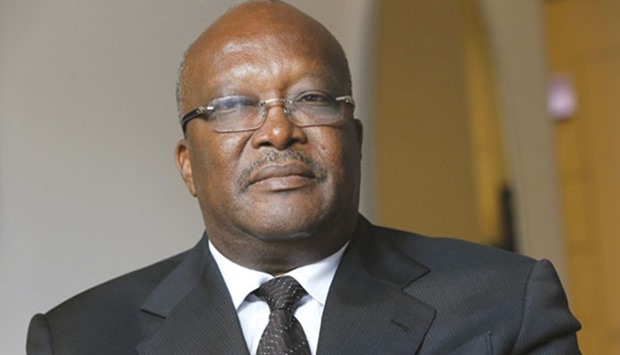Burkina Faso’s constitutional court swore in Roch Marc Kabore as president yesterday, making the former prime minister the country’s first new leader in almost 30 years following his election last month.
The ceremony at an indoor stadium in the capital marks a pivotal moment in a democratic transition in the West African country after veteran leader Blaise Compaore was overthrown in a popular uprising in October 2014.
Most of the country’s leaders since independence from France in 1960 have come to power through coups, including Compaore in 1987 and his predecessor Thomas Sankara four years earlier. Kabore served under Compaore but went into opposition in 2014.
The election could serve as an example to other countries in Africa, where veteran rulers in Burundi, Rwanda and Congo Republic have changed the constitution to allow the extension of their mandates through the ballot box.
“I take this opportunity to institute a rich social dialogue with the Burkinabe people so that together we can break the chains of misery and make a strong dignified and respected nation,” Kabore said.
More than 5,000 people including several West African presidents watched his speech.
“I would like to issue an appeal for more substantial partnership from the international community and financial and economic partners for the efforts to kick-start the economy and improve our country’s governance, he said.
Landlocked Burkina Faso produces cotton and gold but remains impoverished. Its economy has slowed due to lower global commodity prices and reduced investment during the democratic transition that began after Compaore fell.
Kabore earlier told Reuters Burkina needs to improve access to water, healthcare and education. The government said the economy will expand by 4 to 4.5% this year a World Bank figure of 6% growth in 2014.
The swearing-in marks the end of an interim government that held power in the wake of Compaore’s overthrow. Soldiers from the elite presidential guard staged a short-lived coup in September in which they took the transitional president hostage.
Authorities arrested around 20 soldiers for plotting to free from prison a prominent general, Gilbert Diendere, charged with staging that coup, the transitional government said.
The interim government oversaw progress in investigations into the murder of Sankara, whose death is one of the most notorious killings in Africa’s independence history.

Roch Marc Kabore
